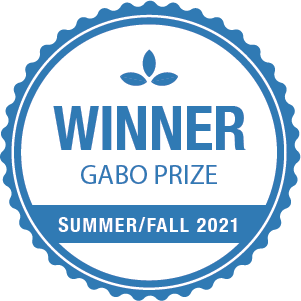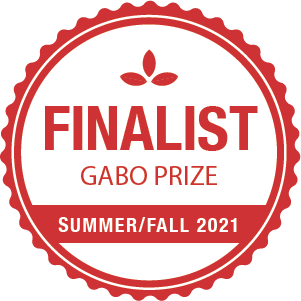The Gabo Prize for Literature in Translation & Multilingual Texts
Issue 19: Summer/Fall 2021
Special Guest Judge, Andrea Lingenfelter
The Summer/Fall 2021 Gabo Prize finalists—two short stories and one poem—have many themes in common. All are concerned with limitations imposed on individuals, whether due to gender, social class, politics, or some combination of these. What happens when we don’t see someone for who they are? What happens when messages are misconstrued, or not heard at all? Each of these pieces explores the consequences of these lapses. “Cut to shreds” is a melancholy, sharply observed work of short fiction (written in German by Kathrin Schmidt and translated by Sue Vickerman) that weaves together all of these themes.
Told from the point of view of an unnamed childhood friend and later romantic partner of the central character, a transgender woman named Dotty, “Cut to shreds” begins on a deceptively light and humorous note. First the narrator wryly sketches Dotty’s background and coming of age in a small, backward town in the former German Democratic Republic (East Germany), and then follows Dotty into adult life, where her initial optimism meets with disappointment.
“Cut to shreds” is full of striking imagery, which Vickerman renders with elegance and clarity, making the story a pleasure to read, despite the sadness that underpins it. The author’s use of extended metaphors also stands out —“Dotty blossomed, but her mum continued to wilt.” Elsewhere, the narrator notes “the tight knot of her mother’s face…[that] nothing ever undid.” Fittingly, much of the imagery is related to articles of clothing and textiles, including the title phrase, which appears more than once in the text itself.
Although the narrator of the story is in love with Dotty and has known her since childhood, they nonetheless misunderstand Dotty’s state of mind and do not recognize her despair. As Vickerman writes in the translator’s statement accompanying the submission: “Lives such as Dotty’s are framed and limited by the social conditions to which they are powerlessly subject, whether these are under the former regime or the new one.”
Vickerman is an accomplished translator. She displays deep sensitivity to language and clearly understands this text from the inside out. As a result, the liberties she has taken in her translation arise organically from Schmidt’s text. In changing both the title and Dotty’s surname, Vickerman has conveyed subtext that would have been lost in more literal renderings, and her discussion of her decision-making process reveals that she gave these translation questions a great deal of thought. She has gone beneath the surface and pondered the rationales underlying Schmidt’s choices, and this thinking informs her translation. Recognizing which aspects of a text will not resonate with the audience in a new language in the same way that they would with an audience reading in the source language and finding ways to translate subtext is the sign of an exceptionally deft translator. Sue Vickerman has rendered Kathrin Schmidt in a way that is richly textured and fully alive.
Andrea Lingenfelter is a poet, translator, and scholar of Chinese literature. Her published books include The Changing Room: Selected Poetry of Zhai Yongming (Northern California Book Award winner), Hon Lai Chu’s The Kite Family (NEA Translation Fellowship grantee), Li Pik-wah’s Farewell My Concubine and The Last Princess of Manchuria, and Candy and Vanishing Act by Mian Mian. Her translations have appeared in Manoa, Granta, Washington Square Review, Chinese Literature Today, Pathlight, Zoland Poetry Annual, Words Without Borders, Asian CHA, Two Lines, and Chicago Review. Her poetry has appeared most recently in Strix and Asian CHA. Current translation projects include two forthcoming collections of poems by Shanghai poet Wang Yin, Ghosts City Sea (Seaweed Salad Editions, June 2021) and longer selected works (The New York Review of Books); Zhai Yongming’s Following Huang Gongwang Through the Fuchun Mountains; and Wang Anyi’s novel Scent of Heaven. A contributor to the Los Angeles Review of Books (and its affiliated China Channel) and Asian CHA, she is also a two-time Vermont Studio Center Luce Translation Fellowship recipient (with Wang Yin, 2017, and Cao Shuying, 2019). Based in Northern California, she teaches literary translation and literature and film of the Asia Pacific at the University of San Francisco.
Reverse Mimesis
written and translated by Whitney DeVos
Five Messenger Pigeons
by Muhammed Khudayyir, translated by Zeena Faulk






